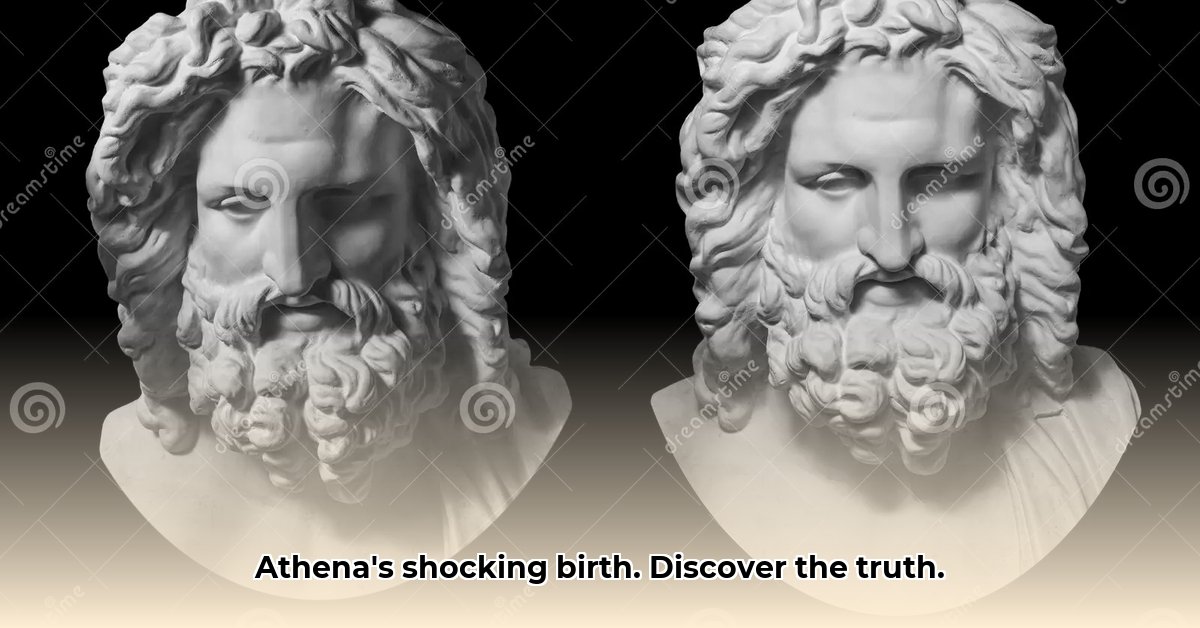
Athena's Explosive Entrance: A Mythological Head-Turner
The birth of Athena, Geboren Uit Hoofd Van Zeus, is far from a run-of-the-mill mythological narrative. Instead of a conventional birth, the mighty Zeus, king of the gods, delivers his daughter fully formed, springing directly from his head. This dramatic image has captivated audiences for millennia, prompting countless interpretations and analyses. The very notion – a goddess emerging fully armed and ready for battle from her father’s skull – immediately sets Athena apart in the pantheon of Greek deities. This unconventional genesis encapsulates not only Zeus's immense power, but also speaks volumes about Athena's unique character and role within Greek mythology. But how does this unconventional birth compare to others in diverse mythologies? What does it tell us about the relationship between father and daughter, and the societal values reflected in this ancient story?
Deconstructing the Divine Delivery: Symbolism and Significance
Athena's unique arrival holds deep symbolic weight. Her emergence from Zeus's head is frequently interpreted as a representation of intellectual power, a direct manifestation of the supreme god's intellect and strategic prowess. However, the symbolism extends beyond this. It can be viewed as a powerful statement of creation, showcasing the ability of the divine to bring forth existence from nothing. This contrasts sharply with the conventional depictions of births within the Greek pantheon, highlighting the exceptional nature of Athena's origin. Did this unconventional birth lead to a different relationship with Zeus compared to that of his other children? This question invites a deeper investigation into the father-daughter dynamic within the context of Greek mythology. The striking image of Athena, bursting forth in full battle regalia, is particularly compelling. It speaks to her inherent strength and readiness, suggesting the equivalence of wisdom and strategic thinking with brute force on the battlefield.
Variations on a Theme: Exploring Multiple Narratives
The myth of Athena’s birth isn't static. Different ancient Greek texts offer varying accounts. Some narrations incorporate Hephaestus, Zeus's skilled blacksmith son, using an axe to crack open Zeus’s head, releasing Athena. These variations highlight the dynamic and evolving nature of ancient storytelling, reflecting evolving societal perspectives and interpretations across different periods of Greek history. The core message remains constant: Athena's exceptional birth emphasizes her unique status and power. But the subtle differences in narrative detail underline the importance of considering multiple sources and acknowledging the fluid nature of myths across time and geographical location.
Athena’s Enduring Influence: A Legacy Across Time
Athen’s remarkable and powerful genesis had a lasting impact on ancient Greek culture and beyond. She became an extremely popular goddess, revered for her wisdom, justice, and exceptional military acumen. Her image adorned temples, pottery, and countless other artifacts, showcasing her importance in ancient Greek society. The enduring legacy of Athena extends into modern times; her influence permeates our language, literature, and visual arts. The very name "Athena" evokes notions of wisdom, strategy, and strength, underscoring her enduring relevance and continuing influence.
Comparative Mythology: Zeus Among the Supreme Beings
Key Takeaways:
- Zeus's dominion over the sky, weather, and law, while extensive, was not absolute, consistently challenged by fate (moira) and his own flaws.
- Comparing Zeus necessitates a comprehensive analysis of his multifaceted nature against similar figures across various pantheons, carefully considering their unique domains of power, inherent weaknesses, and interactions with the mortal world.
- Athena's extraordinary birth stands as a compelling case study, highlighting Zeus's exceptional creative power, yet also raising questions about the methods he employed and the implications of his actions.
- A robust comparative study calls for in-depth investigation across diverse mythological sources to provide a richer understanding of Zeus’s position in the broader landscape of supreme deities.
Zeus's Power: A Measured Supremacy
Zeus, the undisputed king of the Olympian gods, commands the heavens, wields the thunderbolt, and shapes human destinies. His power is undeniable. However, his authority is not absolute. Moira, the inescapable force of fate, acts as a counterpoint to his seemingly limitless abilities. Even Zeus, despite his immense power, must contend with the pre-ordained course of events. This nuance is crucial to understanding his character. He’s not a tyrannical overlord, but a powerful figure who operates within a structured cosmic order. This critical aspect distinguishes him from supreme beings in other pantheons who may be depicted as more absolute and unconstrained in their power. A thorough comparison requires an in-depth analysis of the specific limitations imposed on each supreme deity within their respective mythological frameworks.
A Framework for Comparative Analysis
To effectively compare Zeus to other supreme gods, we must adopt a structured approach:
Domain of Power: Carefully delineate each deity’s sphere of influence – Zeus's control extends over the sky, weather, and law, but other gods may hold dominion over the seas, the underworld, or other realms.
Personality and Actions: Analyze each god’s character traits and actions. Zeus is renowned for his capriciousness and infidelity, while others may exhibit different personality characteristics.
Interactions with Mortals: Compare how each deity interacts with humans. Zeus's frequent interventions in mortal affairs is a defining character trait.
Limitations on Power: Identify specific constraints on each god's abilities. Zeus’s subordination to moira is key, creating a unique dynamic compared to deities in other mythologies.
Symbolism and Iconography: Examine the symbols associated with each deity. The thunderbolt for Zeus, for instance, embodies his power, yet other pantheons use different significant visual representations.
This framework allows a more nuanced comparison, highlighting the unique aspects of Zeus's position and influence within the broader pantheon of supreme deities.
The Need for Further Exploration
A comprehensive understanding of Zeus requires a comparative study investigating diverse mythologies. This requires further research into various cultural narratives and religious systems. Such a comparative analysis will illuminate both the common threads and the unique characteristics that define Zeus within the larger tapestry of mythological traditions.